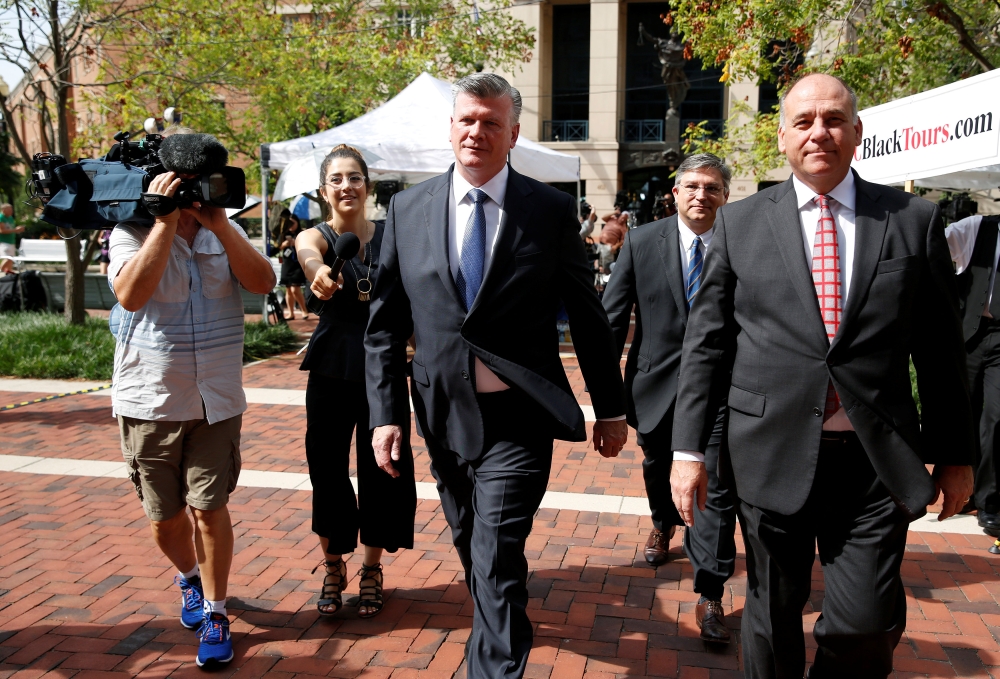
ALEXANDRIA, Virginia — Weighing in even as a Virginia jury deliberates for a second day, President Donald Trump on Friday called the bank and tax fraud trial of his former campaign chairman Paul Manafort “very sad” and described the defendant a “very good person.”
Manafort’s trial in federal court in Alexandria is the first stemming from Special Counsel Robert Mueller’s 15-month-old investigation of Russia’s role in the 2016 US election.
In remarks to reporters at the White House, Trump again called Mueller’s investigation, which had cast a cloud over his presidency, a “rigged witch hunt,” but sidestepped a question about whether he would issue a presidential pardon for Manafort.
“I think the whole Manafort trial is very sad, when you look at what’s going on there. I think it’s a very sad day for our country,” Trump said.
“He worked for me for a very short period of time. But you know what? He happens to be a very good person. And I think it’s very sad what they’ve done to Paul Manafort.”
Trump made his comments while the jury of six women and six men were deliberating behind closed doors on Friday morning. The jurors met for about seven hours on Thursday without reaching a verdict on 18 criminal counts with which Manafort is charged.
As president, Trump has the power to pardon Manafort on the federal charges. He has already issued a series of pardons, including for a political ally, former Arizona sheriff Joe Arpaio. Asked by a reporter on Friday if he would pardon Manafort, Trump said, “I don’t talk about that now.”
The charges largely predate Manafort’s five months working on Trump’s campaign during a pivotal period in the 2016 presidential race, including three months as campaign chairman.
Manafort, 69, faces five counts of filing false tax returns, four counts of failing to disclose his offshore bank accounts and nine counts of bank fraud. If convicted on all counts, he could spend the rest of his life in prison.
Jurors in the trial are not sequestered but have been instructed not to watch news reports or talk to others about the matter.
It is unusual for a US president to make comments about the character of a defendant in an ongoing trial and criticize the legal proceedings. But it was not the first time Trump has weighed in since the Manafort trial began on July 31. On the first day the jury heard testimony, Trump said Manafort had been treated worse than 1920s gangster Al Capone.
Trump has made previous comments criticizing various federal judges and courts and has been harshly critical of Mueller. On Friday, he accused Mueller of having “a lot of conflicts,” but said the special counsel should be allowed to finish a report on Russia’s role in the 2016 election.
Prohibitions on jurors reading about a case they are deciding are difficult to enforce in the smartphone era, said Jens David Ohlin, a professor of criminal law at Cornell University.
“We trust jurors to be on their best behavior and wall themselves off but that kind of goes against human nature,” Ohlin said.
“I think it was very ill-advised for the president to do this. He should have kept his mouth shut,” Ohlin added.
The prosecution could request a mistrial, but such a maneuver was very unlikely, Ohlin said.
Prosecutors accused Manafort of hiding from US tax authorities $16 million in money he earned as a political consultant for pro-Russian politicians in Ukraine to fund an opulent lifestyle and then lying to banks to secure $20 million in loans after his Ukrainian income dried up and he needed cash.
“I think we are optimistic the case might end soon with some sort of verdict,” Judge T.S. Ellis said in open court after the jury resumed deliberations on Friday morning.
The judge made the comment before telling spectators including journalists that he did not want them running out of the courtroom while the jury announces its verdict on the various counts. He did not indicate he had inside knowledge of their deliberations.
The jury sent a note on Thursday afternoon asking Ellis four questions including one about defining “reasonable doubt.” In a criminal case, a jury must find a defendant guilty “beyond a reasonable doubt.”
The jurors also asked Ellis about when someone must disclose a foreign bank account to the Treasury Department, about the definition of a “shelf company” — an inactive company often sold to people aiming to bypass the registration process — and about the exhibit list.
The judge also is due to hear arguments on Friday on a motion filed by seven news organizations seeking the names and addresses of the jurors and alternates, and for the court to unseal documents that have been filed but not made public, apparently related to a motion by the defense. — Reuters